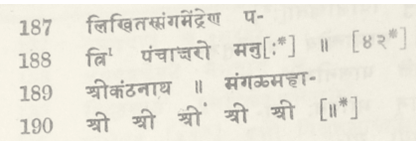|
The Indian Analyst
|
North Indian Inscriptions |
BITRAGUNTA GRANT OF SAMGAMA II.
TRANSLATION. ......(Verse 1.) Let that tusk of Hari (Vishṇu), who disported himself (in the shape of) a boar,— (carried) on which (tusk), as on a staff the Earth appeared to be parasol, with the golden mountain (Mêru) as its point,— protect you ! ......(V. 2.) There was a ruler (called) king Saṁgama [I.], whose uncontrolled, high valour,— which was in conformity with the grant pride of his renowned, powerful arm,— overclouded the unchecked fighting-power of hostile kings, (and) whose shining, excellent lotus-feet were worshipped by the great splendour of the rubies on the humbly bent heads of crores of princes. ......(Vv. 3 and 4.) From him were produced five heroic sons, as, formerly, the (five) celestial trees2 from the milk-ocean :— first, king Harihara ; then, the ruler of the earth, Kampa ; then, the protector of the earth, Bukka ; (and) afterwards, Mârapa and Muddapa. ......(V. 5.) Of these, king Harihara,— by whom the Sultân (Suratrâṇa), who resembled Sutrâman (Indra), was defeated,— ruled the earth for a long time. ......(V. 6.) His younger brother, king Kampaṇa, whose name became true to its meaning, as he made the enemies tremble,3 ruled the earth for a long time.
......(V. 7.) His heroic son was king Saṁgama [II.], just as Jayanta (was the son) of Jambhâri (Indra), and as Pradyumna (was the son) of Śârṅgin (Kṛishṇa). ......(V. 8.) Ah ! surely, Karṇa, the kalpa tree, and the celestial cow eagerly watch his compassionate glance, which fulfils the desires of supplicants.4 ......(V. 9.) It is because she is desirous of resting on his arm (and) unwilling to choose another, that, for a long time, the goddess of Victory enters battles and practises the vow of (walking on) the edges of swords.5 ......(V. 10.) While, by the extensive spreading of his fame, the three worlds experienced supreme delight, the moon was successful in nothing but in causing the water-lilies to unfold.6 ......(V. 11.) “Here comes the glorious lord of both the Eastern and Western oceans, the
disgracer of the wicked kings that break their promises, the destroyer of the armies of opposing ......1 Read
| ||||||||||||||||||||||||||||||||||||||||||||||||||||||||||||||||||||||||||||
| > |
|
>
|








 .
.